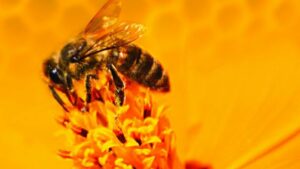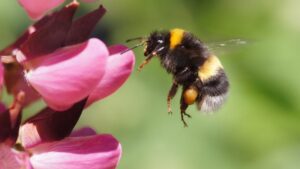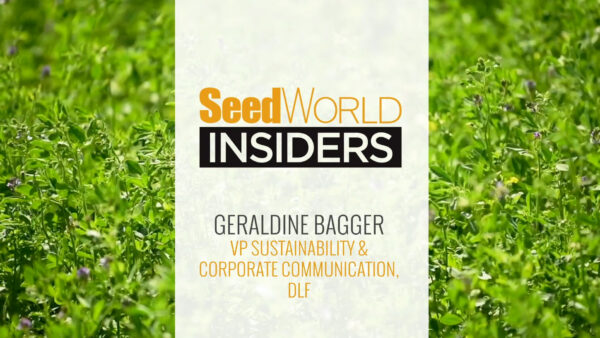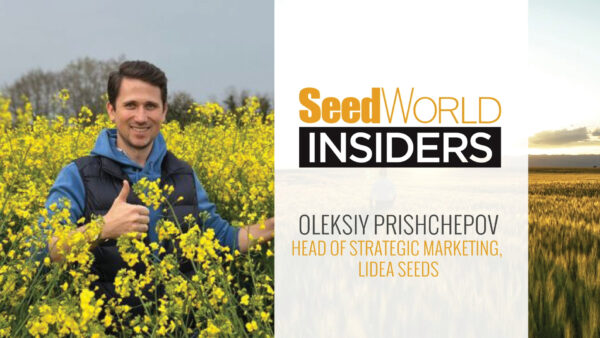European policy making has had a great, but not always positive impact on European agriculture and the seed sector. We only need to recall the process of approving GMOs, new plant protection products, or the recent ban on neonics, just to name a few. To find out more from one of the actors on the side of the seed industry, European Seed sat down with Andre Negreiros, new Seed Applied Technologies (SAT) Leader, EMEA for Corteva Agriscience™, Agriculture Division of DowDuPont.
European Seed (ES): Andre, you have witnessed the recent EU decision on the neonics. Do you think this was a good decision?
Andre Negreiros (AN): This was a very controversial decision. If you think about the last years, after the neonicotinoids interdiction in the main crops, it is possible to notice a considerable change in the European way of farming. This sudden prohibition, without a proper selection of substitute products, has turned farming into a very challenging activity, especially in some geographies where pest pressure is considerably high. It has undermined farmer competitiveness and fragilized the territory food chain. However, I believe we have passed the time to discuss this decision; at this moment, our industry must focus on R&D investments to develop solutions that balance regulatory objectives and farmers’ needs to meet societal expectations of a safe, healthy and abundant food supply. This is our company’s main challenge and in the last years we have been registering seed applied technologies with a very promising profile, bringing more efficient solutions for the EU reality.
[tweetshare tweet=”We have passed the time to discuss about the neonic decision; now we must focus on R&D investments to develop solutions that balance regulatory objectives and farmers’ needs” username=”EuropeanSeed”]
ES: In terms of the neonics decision, what should have been done differently on both sides (EU & industry sector)?
AN: My personal view in this situation is that there was a lack of dialogue between all the involved sides, even society, that should have received more concrete and scientific information about the neonicotinoids matter. I also believe that the industry was reactive on the subject and could have discussed and worked on the main concerns raised by the authorities in a more proactive way. From now on, the best option for the industry is to adjust itself on the new requirements delivering solutions responding to both consumers and farmers’ needs. Nowadays, the European seed treatment market has already access to new technologies, such as our new insecticide seed treatment, with excellent effectiveness among the main pests and very safe for the pollinator insects. This product is an example that R&D can find seed-applied solutions to greatly substitute neonicotinoids.
ES: Research has proven that seed applied technologies dramatically reduce the amount of crop protection products that need to be applied. Why is there still opposition?
AN: When the products are applied via seed treatment, besides considerably reducing the amount of active ingredients used by the crop, there is a significant increase of effectiveness in the application. That happens because the product is applied in small amount directly in the seed which is the pests and diseases target during the crop establishment. Besides that, it is very important to emphasize that the industrial/professional seed treatment drastically reduces the chemical exposure of all field workers and the environment, a great differentiator of this technology. The challenge of the industry is to keep showing that, year after year, the technologies and the application techniques are being enhanced, helping the adoption of this safer innovation.
ES: The neonics ban has deprived EU farmers of a key tool to stave of insect pests. What alternatives are there?
AN:Our industry is in a constant run to bring new solutions to address the neonicotinoids ban. Our company in 2017 registered an innovative solution to efficiently support farmers in the lack of neonics. The first registration of the product (Lumiposa®), in the EU was for oilseed rape and in its first year the product has been strongly recognized by farmers. This is a solution that addresses the regulatory requirements and the key farmers’ needs. New crops and countries are in our product registration plans, and we feel this will revolutionize our pest management in a more responsible way. In the same direction, we will soon have a new fungicide seed treatment at our disposal, which demonstrates our strong innovation focus.
ES: Are there other dossiers where the EU took the wrong decision?
AN: It is very hard to judge the EU Commission decisions. If you consider the way the technologies have been analyzed in the rest of the world, it is clear that EU’s processes are stricter. But I do believe that we should change our perspective and start seeing this as an opportunity to innovate, invest resources and find new solutions to address the main issues that our farmers still face in their fields. In parallel, we need to continue working with the European Commission, so we can provide them with scientific data to properly answer questions and move together with good sense towards a more sustainable agriculture in the continent.
[tweetshare tweet=”We need to continue working with the European Commission, provide them with scientific data to properly answer questions and move together to a more sustainable agriculture” username=”EuropeanSeed”]
ES: Certain civil society organizations are strongly critical of synthetic pesticides and many other innovations in agriculture. How can we turn the tide?
AN: I believe that the industry has a very relevant role to help demystifying the common-sense view about pesticides. Society concerns are understandable and deserve proper attention and scientific information. The industry has the responsibility to show that, nowadays, there are responsible companies delivering technologies that address both consumers’ concerns and farmers’ needs. It is about time for us to start having a healthy discussion with society showing solutions, innovations and proven scientific data that will help avoid misunderstandings and ideological discussions.














